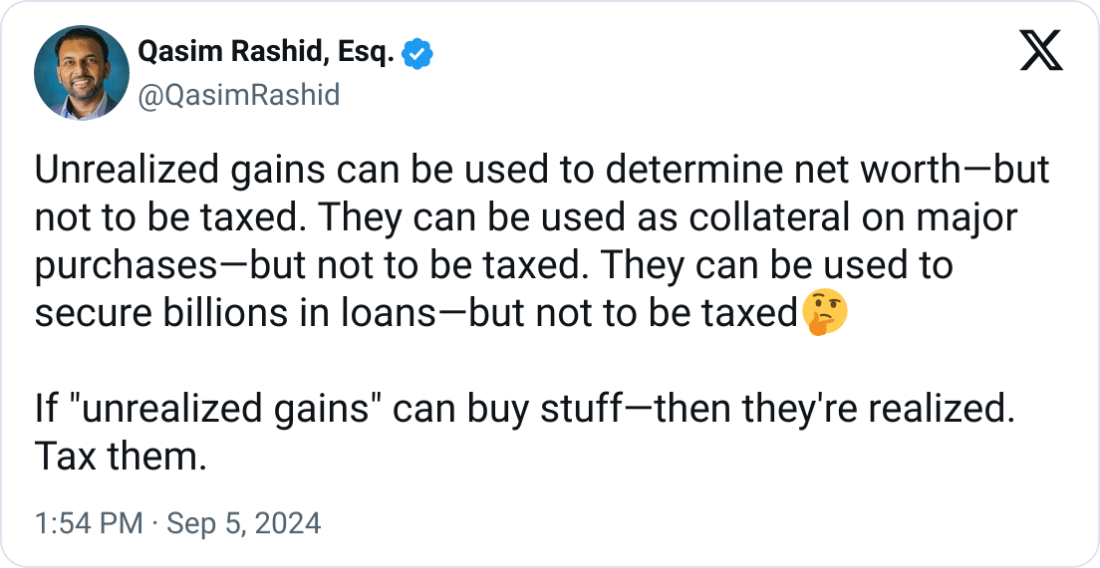this post was submitted on 19 Sep 2024
905 points (96.7% liked)
Microblog Memes
5402 readers
3123 users here now
A place to share screenshots of Microblog posts, whether from Mastodon, tumblr, ~~Twitter~~ X, KBin, Threads or elsewhere.
Created as an evolution of White People Twitter and other tweet-capture subreddits.
Rules:
- Please put at least one word relevant to the post in the post title.
- Be nice.
- No advertising, brand promotion or guerilla marketing.
- Posters are encouraged to link to the toot or tweet etc in the description of posts.
Related communities:
- !whitepeopletwitter@sh.itjust.works
- !best_of_mastodon@sh.itjust.works
- !curatedtwitter@sh.itjust.works
- !curatedtumblr@sh.itjust.works
founded 1 year ago
MODERATORS
you are viewing a single comment's thread
view the rest of the comments
view the rest of the comments

So how does taxing unrealized gains work. If I purchase stock X at a specific price. If the stock goes up and I now am holding 150% of my original value. Let's say it hovers there for 3 more years. After 3 years it tanks and is now worth only 50% of my original purchases. Are people suggesting that I pay taxes on the unrealized gain of 50%, even though I end up selling at loss and have realized negative value. Doesn't that mean I am being taxed on losing money? How does that make sense?
Frankly I feel like the better option is to just not let people borrow based on stocks at all. Even if you paid in at X price, there's no guarantee it'll still be at X price or greater when the loan comes due, so to speak.
The moment you use them as a collateral, they should be taxed as money.
You took a 10 billions loan with the actions you have as collateral? You pay taxes on these 10 billions.
Right now, the system is rigged because the richs get to transform their collateral into liquidity while paying 0 taxes on that, and they can even write off the interest on the interest incurred.
I guess that's whats lost in the meme. Just because you "can" use something as collateral doesn't mean you "are" using something as collateral. The language should be more accurate to describe actual use vs hypothetical.
No...see you bought the stock. You don't have enough of a hoard for us to worry about not to mention the value of that stock will be used in the economy more than likely when You retire or need it.
How it will work is you are an early owner or investor and your hoard pile is over $100 million. Now when your hoard pile goes up 7% you have $107 million. We tax you on your wealth over $ 100 million. Let's say 25% tax on that $7 million if you choose to hold onto it. Your wealth tax bill will be $1,750,000 that year (plus minus other factors). You can choose to sell your $7 million and it is currently taxed at 18% for realized tax gains if you held onto the stock for over a year or income % tax rate if short term trade.
What this does is increase the public ownership in companies as there is more stock for everyone and decreases the hoarding of companies by the wealthy. It also makes stock prices more honest so people don't hoard the stock count to inflate prices.
Let's say you own other assets. A house. It is just like property tax if you can't afford the tax bill you don't own the house or....your house isn't worth that much. If you have tons of homes you may have to sell it to the people rather than rent. And if your hoard of assets is in other random collectibles you pay the tax bill to maintain your collection or share the ownership with others.
As for private companies that will be an interesting thing. I would say when your company is worth $100 million you have to divest the ownership to others. But idk. Legalize will figure it out we can also have exceptions for things like house value or other random things
Why not tax on a regular basis based on the current value, just like we do with houses?
It's not. Unrealised gains is basically an item in your shelf that hasn't been sold, you can tell other people this item worth X now and you can get a loan with that item as a guarantee, but since you haven't sell it and turn it into money, you still have $0 and an item that worth X. These people failed basic economic.
"can" vs "do" are different things. The meme quote describes hypothetical use, not actual use, as being something that should be taxable.
What you mean by "hypothetical use" vs "actual use"? In your own comment you mention nothing about "hypothetical use" yet here you talk about one, OOP also failed to mention anything about hypothetical use and only talk exclusively about unrealised gain. If unrealised gain(stock, asset, etc) is used to trade for another item, then yes, it's already a realised gain, the tax should be levied on the item purchased or the asset sold, whichever makes sense. If the unrealised gain is used to secure a loan, then no, it shouldn't be taxed because it's only change hand on paper, and the loan came with interest, and you have to pay back that loan. Net worth is nothing but a dick measuring contest, taxing it makes no sense.
So no, unrealised gain shouldn't be taxed because it's unrealised, it's like taxing a grocery store's unsold item.